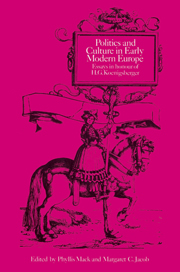Book contents
- Frontmatter
- Contents
- Introduction
- The court of the Spanish Habsburgs: a peculiar institution?
- The magnificent Lorenzo de' Medici: between myth and history
- Political rhetoric and poetic meaning in Renaissance culture: Clément Marot and the Field of Cloth of Gold
- The unlikely Machiavellian: William of Orange and the princely virtues
- The Estates of Brabant to the end of the fifteenth century: the make-up of the assembly
- Presents and pensions: a methodological search and the case study of Count Nils Bielke's prosecution for treason in connection with gratifications from France
- Between Bruni and Machiavelli: history, law and historicism in Poggio Bracciolini
- Constitutional discourse in France, 1527–1549
- Lieuwe van Aitzema: a soured but knowing eye
- John Calvin's contribution to representative government
- Luther and the humanists
- Scholars and ecclesiastical history in the Early Modern period: the influence of Ferdinando Ughelli
- ‘By an Orphean charm’: science and the two cultures in seventeenth-century England
- The crisis of the European mind: Hazard revisited
- Isaac Beeckman and music
- Decadence, shift, cultural changes and the universality of Leonardo da Vinci
- Bibliography of the writings of HELMUT GEORG KOENIGSBERGER
- Index
Between Bruni and Machiavelli: history, law and historicism in Poggio Bracciolini
Published online by Cambridge University Press: 20 October 2009
- Frontmatter
- Contents
- Introduction
- The court of the Spanish Habsburgs: a peculiar institution?
- The magnificent Lorenzo de' Medici: between myth and history
- Political rhetoric and poetic meaning in Renaissance culture: Clément Marot and the Field of Cloth of Gold
- The unlikely Machiavellian: William of Orange and the princely virtues
- The Estates of Brabant to the end of the fifteenth century: the make-up of the assembly
- Presents and pensions: a methodological search and the case study of Count Nils Bielke's prosecution for treason in connection with gratifications from France
- Between Bruni and Machiavelli: history, law and historicism in Poggio Bracciolini
- Constitutional discourse in France, 1527–1549
- Lieuwe van Aitzema: a soured but knowing eye
- John Calvin's contribution to representative government
- Luther and the humanists
- Scholars and ecclesiastical history in the Early Modern period: the influence of Ferdinando Ughelli
- ‘By an Orphean charm’: science and the two cultures in seventeenth-century England
- The crisis of the European mind: Hazard revisited
- Isaac Beeckman and music
- Decadence, shift, cultural changes and the universality of Leonardo da Vinci
- Bibliography of the writings of HELMUT GEORG KOENIGSBERGER
- Index
Summary
In 1453, nine years after Leonardo Bruni's death, Poggio Bracciolini, his friend and fellow-student of Salutati, succeeded him as chancellor of the Florentine Republic. Poggio, by then seventy-three years old, had, like Bruni, received his early intellectual formation in the circle of humanists around Salutati, and, again like Bruni, had as a young man left Florence for a career in the Papal Curia. Poggio was to remain with the Curia for the greater part of his life, never, however, cutting himself off from his Florentine friends, or, for that matter, from Florentine life generally.
In 1453, at a critical moment in the war then raging between Florence and Milan on the one hand, and Venice and Naples on the other, Poggio accepted the Signoria's offer of the chancellorship and, in a context not unlike that pertaining during the tenures of Salutati and Bruni in the period of the earlier Visconti wars, returned amidst popular acclaim to the city of his youth.
There is, then, a kind of symmetry in the lives of Salutati, Bruni and Poggio. Poggio, although born at Lanciola, near Terranuova, was brought up in Arezzo, the town of Bruni's birth, and, like Bruni, was sent to the Florentine Studio to study notarial law.
- Type
- Chapter
- Information
- Politics and Culture in Early Modern EuropeEssays in Honour of H. G. Koenigsberger, pp. 119 - 152Publisher: Cambridge University PressPrint publication year: 1987
- 4
- Cited by



